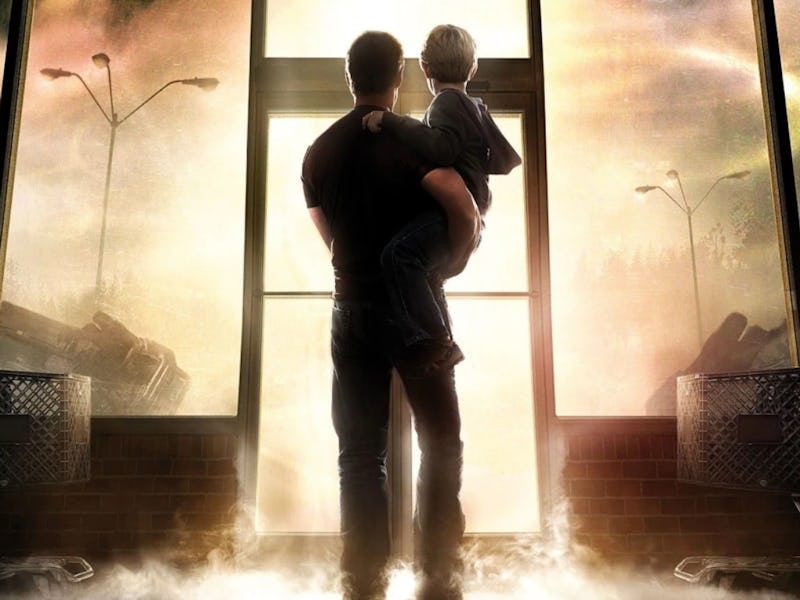How The Mist’s infamous ending created the darkest Stephen King adaptation
A single change to the story sparked controversy... and praise.

“As a species, we're fundamentally insane,” Ollie Weeks (Toby Jones) says. “Put more than two of us in a room, we pick sides and start dreaming up reasons to kill one another. Why do you think we invented politics and religion?”
Such is the premise of The Mist, an adaptation of the Stephen King novella. But the movie is so much more than a psychological portrait of what happens when you stick a bunch of townies in a grocery store for days while monsters lurk outside.
The narrative trope of confining people in close quarters isn’t unique — there’s Cube, Clue, Squid Game, and Snowpiercer, to name a few, along with practically every haunted house and prisonbreak movie ever made. These have already provided a plausible answer for what happens when strangers with differing viewpoints are forced to work together to solve a mystery, defeat a Big Bad, or win a competition. It’s rarely easy, yet sometimes, against all odds, happy endings are achievable.
The Mist, however, offers a refreshing twist on the trope of being trapped, and one of the bleakest takes on the horror microgenre. Directed by Frank Darabont, who’d already adapted The Green Mile and The Shawshank Redemption, it takes place in the usual setting of King’s spooky stories: Maine.
After a severe thunderstorm strikes the small town of Bridgton, a thick mist advances over the lakes. Neighbors congregate at the supermarket to buy supplies, and from inside the store, they begin to see the mist thicken, speeding police cars crash into each other, and locals scream in terror. A civil alert siren blares, and the worried shoppers decide to barricade the supermarket.
Calamity, of both the monster and the inner-demon kind, ensues. Tentacled creatures, pterodactyl-like predators, and giant spiders take over Bridgton and swarm the supermarket exterior. As people outside are devoured, those within become consumed by dread and fear. Mrs. Carmody (Marcia Gray Harden), an unlikely but ruthless villain, begins preaching about Biblical Armageddon. Others are less convinced, while some keep tight-lipped about the truth of the mist’s origins.
As salacious secrets and old grudges come to the forefront, father David Drayton (Thomas Jane) and a volunteer party venture out against Carmody’s wishes to gather supplies and see if they have any chance against these invaders. Things go from bad to worse, and then, in one of the most distressing movie endings of all time, they’re suddenly good again.
Another day in King’s favorite state.
Darabont would go on to develop the iconic first season of AMC’s The Walking Dead, and he brought along Mist alums Jeffrey DeMunn, Laurie Holden, Melissa McBride, and Juan Gabriel Pareja. The ensemble cast here does a superb job at keeping our first impressions of their characters intact, while also letting these presumptions unravel in the aisles of The Food House. The strangers lose their marbles, but they still have some core desires, motivations, and beliefs to cling to, even in the face of supernatural chaos. It’s this aspect of humanity — the argument that we’re all a bit too set in our ways and too determined to convince others to see things from our perspective — that leads to the most unnecessary bloodshed.
The Mist is a must-watch because its villains are plentiful, and many aren’t immediately obvious. There are the CGI monsters, sure, and the manipulative zealot Mrs. Carmody, but individualism is another villain, as is the American government. There’s commentary aplenty about religious extremism and political cover-ups, and the movie’s hot takes are mostly convincing. We could all stand to be more skeptical of authority, and more willing to look out for each other instead of embracing a dog-eat-dog mantra. The Mist amplifies this lesson to a grotesque degree.
A typical reaction to the ending.
But it’s still a horror film above all else, and its final five minutes still send chills down our spine 15 years later. When Frank Darabont asked Stephen King for permission to change the story’s ending, it’s said that King was not only amenable but awe-struck by the depravity of the idea.
The Mist floored a master of horror. Make of that what you will.
The Mist is streaming now on Netflix.
This article was originally published on